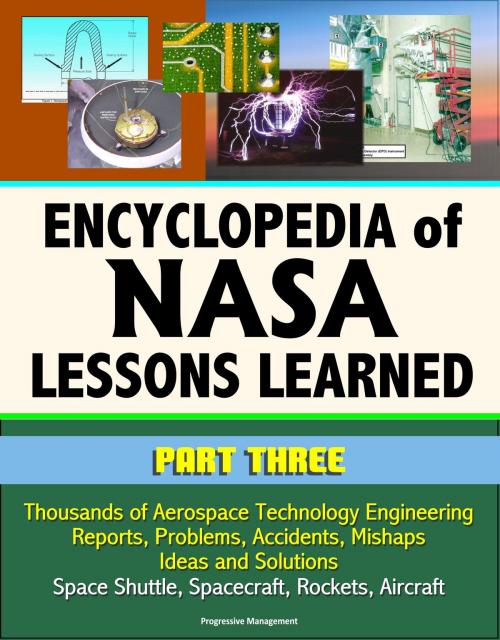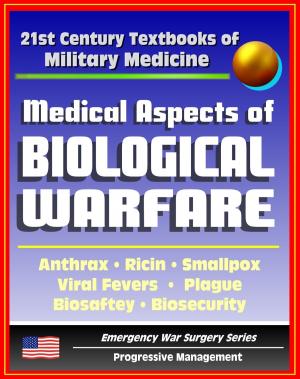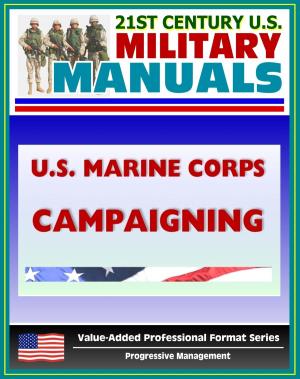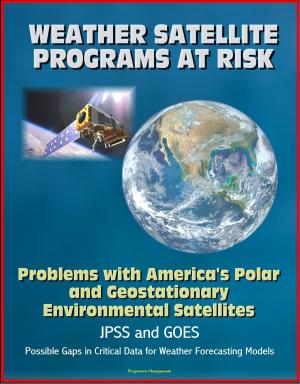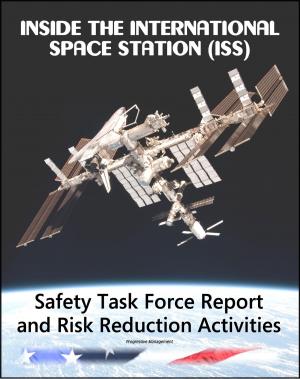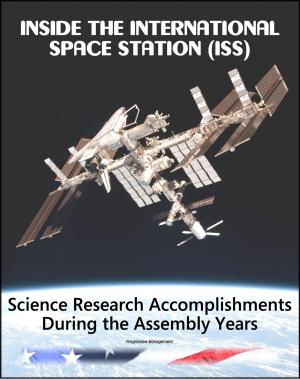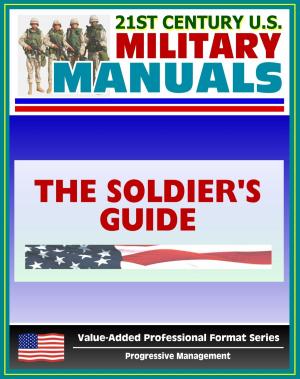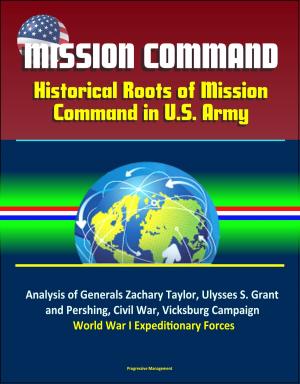Encyclopedia of NASA Lessons Learned (Part 3): Thousands of Aerospace Technology Engineering Reports, Problems, Accidents, Mishaps, Ideas and Solutions - Space Shuttle, Spacecraft, Rockets, Aircraft
Business & Finance, Industries & Professions, Quality Control, Nonfiction, Science & Nature, Technology, Aeronautics & Astronautics| Author: | Progressive Management | ISBN: | 9781311986436 |
| Publisher: | Progressive Management | Publication: | August 29, 2014 |
| Imprint: | Smashwords Edition | Language: | English |
| Author: | Progressive Management |
| ISBN: | 9781311986436 |
| Publisher: | Progressive Management |
| Publication: | August 29, 2014 |
| Imprint: | Smashwords Edition |
| Language: | English |
Discover what NASA has learned during the last few decades of spacecraft and aircraft flight operations and on-the-ground engineering activities! We've gathered thousands of detailed reports from the NASA Public Lessons Learned System (LLIS). The NASA Lessons Learned system provides access to official, reviewed lessons learned from NASA programs and projects. These lessons have been made available to the public by the NASA Office of the Chief Engineer and the NASA Engineering Network. Each lesson describes the original driving event and provides recommendations that feed into NASA’s continual improvement via training, best practices, policies, and procedures.
Because of the huge size of this compilation (nearly 4000 pages in total), it has been divided into six parts for ebook reproduction. This description applies to the totality of the reproduction.
The reports frequently include practical advice suitable for anyone with responsibilities in any technical or engineering endeavor, not just the aerospace industry. Vehicles in the reports include the Space Shuttle, many unmanned spacecraft and satellites (including Mars landers and rovers), experimental programs, aircraft, rockets and launch vehicles.
Not everything is rocket science, however; for example, there is a report about the hazards of keeping pressurized containers in hot automobiles. Cross-cutting issues are covered, such as "ESD: An Enduring and Insidious Threat to Flight Hardware (A Cornerstone Lesson)" provide unique insights gleaned from NASA experience. There is extensive material on components and parts.
Look for the fascinating entry by a retired Associate Director of Flight Projects at NASA Goddard Space Flight Center (GSFC) providing over 100 lessons learned for project managers. An example: "Redundancy in hardware can be a fiction. We are adept at building things to be identical so that if one fails, the other will also fail. Make sure all hardware is treated in a build as if it were one of a kind and needed for mission success."
Topics covered: Accident * Activity * Administration * Advisory * Aerospace * Aided * Air * Aircraft * Article * Assessment * Assurance * Business * Communication * Computer * Computers * Configuration * Cryogenic * Design * Development * Devices * Disposal * Education * Emergency * Energetic * Energy * Engineering * Environment * Equipment * Explosive * Explosives * External * Extra * Facilities * Facility * Factors * Financial * Fire * Flight * Ground * Handling * Hardware * Hazardous * Health * Human * Independent * Industrial * Information * Investigation * Launch * Lifting * Logistics * Management * Manufacturing * Materials * Medical * Mishap * Mission * Nasa * Occupational * Operations * Organization * Packaging * Panel * Parts * Payloads * Personal * Phase * Planning * Policy * Preparedness * Pressure * Processes * Processing * Procurement * Program * Project * Propellant * Protection * Protective * Protocol * Pyrotechnic * Range * Redundant * Relations * Reporting * Requirements * Research * Resources * Risk * Rtg * Safety * Security * Small * Software * Spacecraft * Spanning * Standard * Standards * Storage * Storm * Studies * Support * Sustainability * Switch * Switching * Systems * Systems ground * Technology * Term * Test * Testing * Toxic * Trade * Traffic * Training * Transportation * Tree * Trunk * Unicast * Unit * Validation * Vehicle * Vehicular * Verification * Vessels * Waste.
NASA centers and Mission directorates include: Ames Research Center * Dryden Flight Research Center * Glenn Research Center * Goddard Space Flight Center * NASA Headquarters * NASA IVV * Jet Propulsion Laboratory * Johnson Space Center * Kennedy Space Center * Langley Research Center * Marshall Space Flight Center * Stennis Space Center * Wallops Flight Facility * White Sands Test Facility * Mission Directorates * Aeronautics Research * Exploration Systems * Science * Space Operations
Discover what NASA has learned during the last few decades of spacecraft and aircraft flight operations and on-the-ground engineering activities! We've gathered thousands of detailed reports from the NASA Public Lessons Learned System (LLIS). The NASA Lessons Learned system provides access to official, reviewed lessons learned from NASA programs and projects. These lessons have been made available to the public by the NASA Office of the Chief Engineer and the NASA Engineering Network. Each lesson describes the original driving event and provides recommendations that feed into NASA’s continual improvement via training, best practices, policies, and procedures.
Because of the huge size of this compilation (nearly 4000 pages in total), it has been divided into six parts for ebook reproduction. This description applies to the totality of the reproduction.
The reports frequently include practical advice suitable for anyone with responsibilities in any technical or engineering endeavor, not just the aerospace industry. Vehicles in the reports include the Space Shuttle, many unmanned spacecraft and satellites (including Mars landers and rovers), experimental programs, aircraft, rockets and launch vehicles.
Not everything is rocket science, however; for example, there is a report about the hazards of keeping pressurized containers in hot automobiles. Cross-cutting issues are covered, such as "ESD: An Enduring and Insidious Threat to Flight Hardware (A Cornerstone Lesson)" provide unique insights gleaned from NASA experience. There is extensive material on components and parts.
Look for the fascinating entry by a retired Associate Director of Flight Projects at NASA Goddard Space Flight Center (GSFC) providing over 100 lessons learned for project managers. An example: "Redundancy in hardware can be a fiction. We are adept at building things to be identical so that if one fails, the other will also fail. Make sure all hardware is treated in a build as if it were one of a kind and needed for mission success."
Topics covered: Accident * Activity * Administration * Advisory * Aerospace * Aided * Air * Aircraft * Article * Assessment * Assurance * Business * Communication * Computer * Computers * Configuration * Cryogenic * Design * Development * Devices * Disposal * Education * Emergency * Energetic * Energy * Engineering * Environment * Equipment * Explosive * Explosives * External * Extra * Facilities * Facility * Factors * Financial * Fire * Flight * Ground * Handling * Hardware * Hazardous * Health * Human * Independent * Industrial * Information * Investigation * Launch * Lifting * Logistics * Management * Manufacturing * Materials * Medical * Mishap * Mission * Nasa * Occupational * Operations * Organization * Packaging * Panel * Parts * Payloads * Personal * Phase * Planning * Policy * Preparedness * Pressure * Processes * Processing * Procurement * Program * Project * Propellant * Protection * Protective * Protocol * Pyrotechnic * Range * Redundant * Relations * Reporting * Requirements * Research * Resources * Risk * Rtg * Safety * Security * Small * Software * Spacecraft * Spanning * Standard * Standards * Storage * Storm * Studies * Support * Sustainability * Switch * Switching * Systems * Systems ground * Technology * Term * Test * Testing * Toxic * Trade * Traffic * Training * Transportation * Tree * Trunk * Unicast * Unit * Validation * Vehicle * Vehicular * Verification * Vessels * Waste.
NASA centers and Mission directorates include: Ames Research Center * Dryden Flight Research Center * Glenn Research Center * Goddard Space Flight Center * NASA Headquarters * NASA IVV * Jet Propulsion Laboratory * Johnson Space Center * Kennedy Space Center * Langley Research Center * Marshall Space Flight Center * Stennis Space Center * Wallops Flight Facility * White Sands Test Facility * Mission Directorates * Aeronautics Research * Exploration Systems * Science * Space Operations
